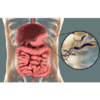
If you’re struggling with Irritable Bowel Syndrome (IBS), you know how frustrating it can be to find relief from symptoms like abdominal pain, bloating, gas, and irregular bowel movements.
Two dietary approaches have gained significant attention for managing IBS symptoms: the low FODMAP diet and elimination diets based on IgG food intolerance testing. But which one is more effective?
Spoiler alert… Recent research suggests that personalized IgG testing might provide better results than the commonly recommended low FODMAP approach.
Understanding IBS and Dietary Management
Irritable Bowel Syndrome affects millions worldwide, characterized by recurring abdominal pain, bloating, gas, changes in stool consistency, and altered bowel habits. While the exact cause remains elusive, mounting evidence suggests that food sensitivities play a crucial role in triggering or exacerbating symptoms.
That’s right. Food.
Many patients report that certain foods worsen their symptoms, with studies indicating that 20-67% of IBS sufferers notice symptom flare-ups after eating. This connection between diet and IBS has led to different dietary intervention strategies.
The Research: Comparing Dietary Approaches for IBS
A revealing study published in the Journal of Clinical Medicine compared three different dietary treatments for women diagnosed with mixed IBS (IBS-M):
- Low FODMAP diet – Reducing fermentable oligosaccharides, disaccharides, monosaccharides, and polyols
- IgG-based elimination-rotation diet – Personalized diet based on food-specific IgG antibody testing
- Control diet – Standard dietary recommendations from their attending gastroenterologist
The 8-week study involved 73 female patients with IBS-M (mixed) and measured changes in typical IBS symptoms, dyspeptic symptoms, and extra-intestinal symptoms before and after dietary intervention.
Key Findings: IgG Testing Shows Superior Results
The results were striking. While both specialized diets showed improvements over the control diet, the IgG-based elimination-rotation diet demonstrated significantly better outcomes across all measured symptoms:
Core IBS Symptoms
- Abdominal Pain: In the IgG group, abdominal pain decreased from 76.2% to just 9.5% of patients. Post-meal abdominal pain dropped from 66.7% to 9.5%.
- Bloating: Decreased dramatically from 90.5% to 9.5% in the IgG group, compared to a reduction from 84.6% to 26.9% in the FODMAP group.
- Constipation: Improved significantly only in the IgG group (from 66.7% to 19%).
- Mucus in Stool: Completely eliminated in the IgG group (from 28.6% to 0%).
Dyspeptic (Indigestion) Symptoms
- Nausea and Belching: Completely resolved in the IgG group.
- Heartburn: Significantly reduced from 33.3% to just 4.8% with the IgG approach.
Beyond Digestive Symptoms
Perhaps most surprisingly, the IgG-based diet also improved extra-intestinal symptoms associated with IBS:
- Fatigue and Weakness: Reduced from 33.3% to just 4.8%
- Skin Conditions: Completely resolved in all patients
- Headaches/Migraines: Complete resolution with the IgG diet
By contrast, the low FODMAP diet mainly improved bloating, gurgling sensations, and gastric fullness, but showed less impact on other symptoms. The control diet showed no significant improvements in any symptoms.
Why Might IgG Testing Work Better?
The study suggests that IBS may involve low-grade inflammation triggered by specific foods. IgG antibodies, which indicate immune responses to foods, might identify your personal triggers more accurately than a generalized approach like the FODMAP diet.
IgG testing allows for a truly personalized approach – each patient eliminates only foods that trigger their specific immune response, rather than following a standardized diet that restricts the same foods for everyone.
Additionally, the IgG approach detected food sensitivities that might not be high in FODMAPs. This explains why symptoms like fatigue, skin issues, and headaches – which aren’t typically targeted by FODMAP restriction – improved with the IgG-guided diet.
What This Means For You
If you’re struggling with IBS despite trying the low FODMAP diet, IgG food sensitivity testing might provide the personalized approach you need. The research suggests several key takeaways:
- Personalization matters: Your food triggers may differ from other IBS patients.
- IBS is complex: The connection between IBS and immune responses to food appears stronger than previously thought.
- Beyond gut symptoms: Food sensitivities might also contribute to fatigue, skin issues, and headaches in IBS patients.
Implementing an IgG-Based Approach
It’s important to work with a qualified healthcare provider to conduct IgG food sensitivity testing so that you can identify your specific trigger foods. Based on these results, you would follow an elimination-rotation diet that:
- Eliminates IgG-positive foods (those showing elevated antibody levels)
- Allows all IgG-negative foods in rotation
- Eventually reintroduces foods systematically to determine tolerance levels
We can help!
We use blood-based IgG food intolerance testing in many of our patients with IBS quite successfully. This provides a much more individualized approach so that you don’t have to eliminate so many foods AND we know the foods you’re eliminating are truly the source of the problem.
Book your IgG food intolerance test right here!
The Bottom Line
While the low FODMAP diet remains a valuable tool for managing IBS symptoms, research suggests that an IgG-guided elimination diet may provide superior symptom relief for many patients. The personalized nature of IgG testing appears to address the individual immune responses that contribute to IBS symptoms – both digestive and extra-intestinal.
If you’ve been struggling with persistent IBS symptoms despite dietary changes, considering IgG food sensitivity testing as a different approach might be your next step toward finding relief from IBS.
What do you have to lose?
Note: This blog post is based on scientific research, including a study published in the Journal of Clinical Medicine comparing different dietary approaches for IBS management. Individual results may vary, and dietary changes should be made under appropriate medical supervision.











